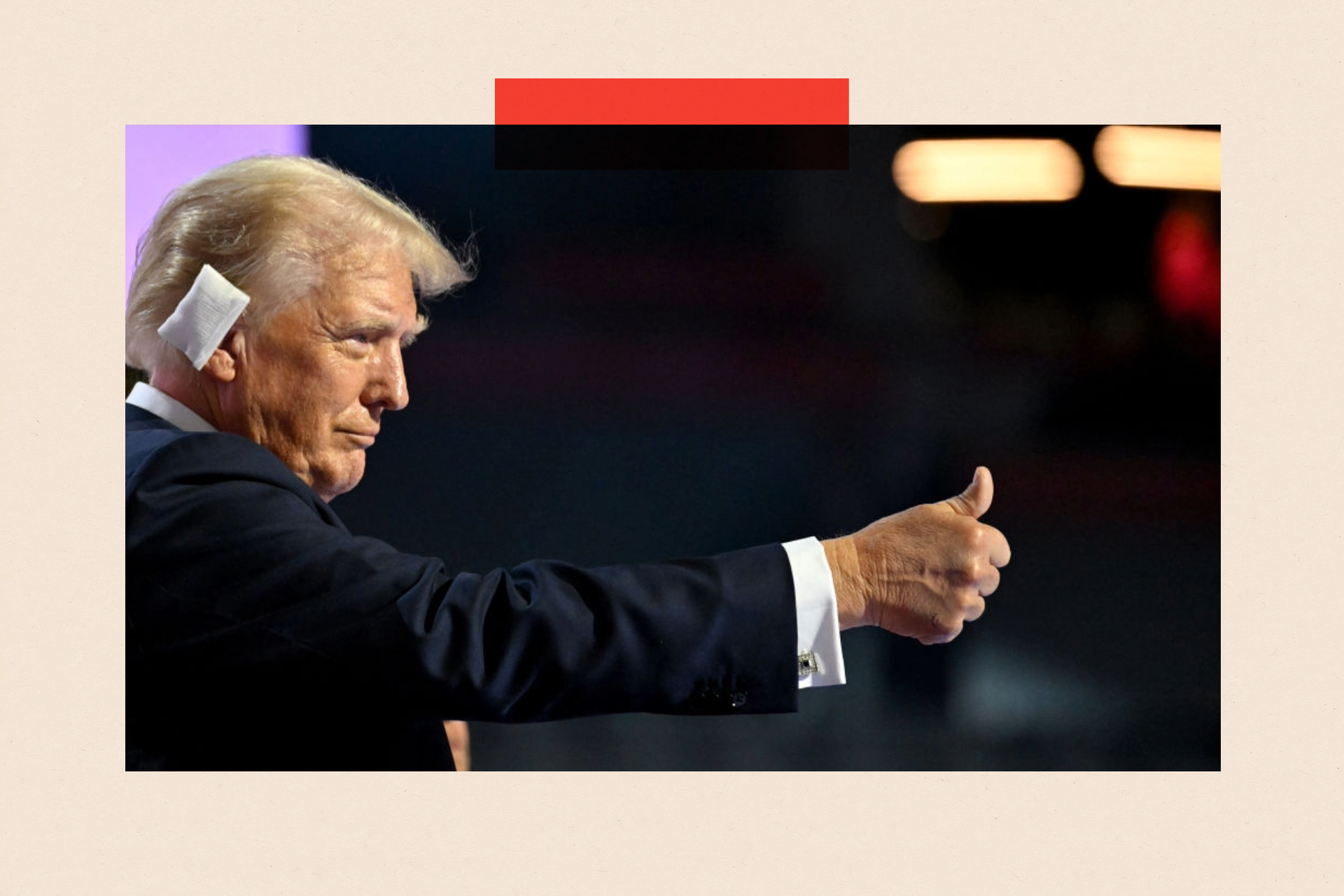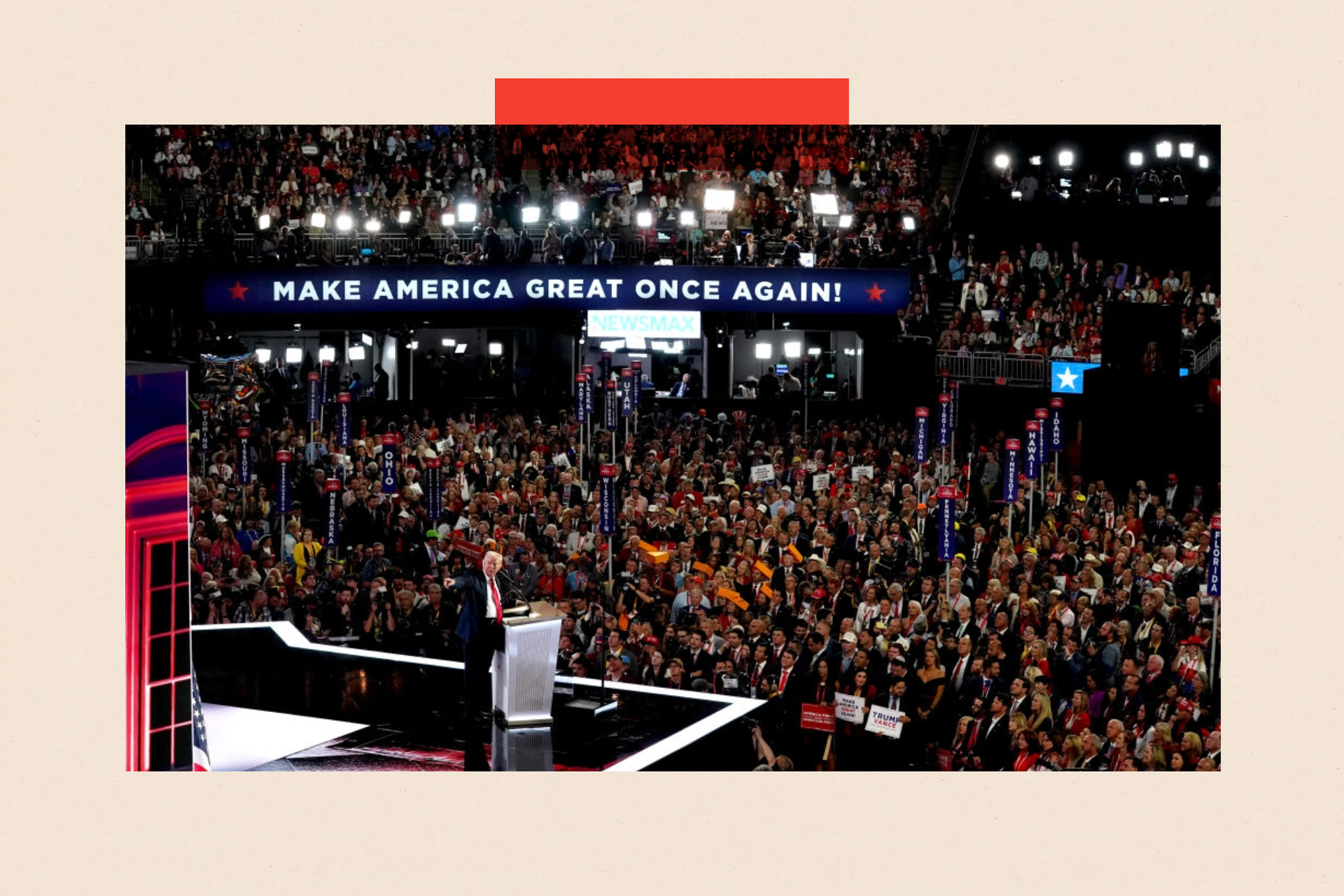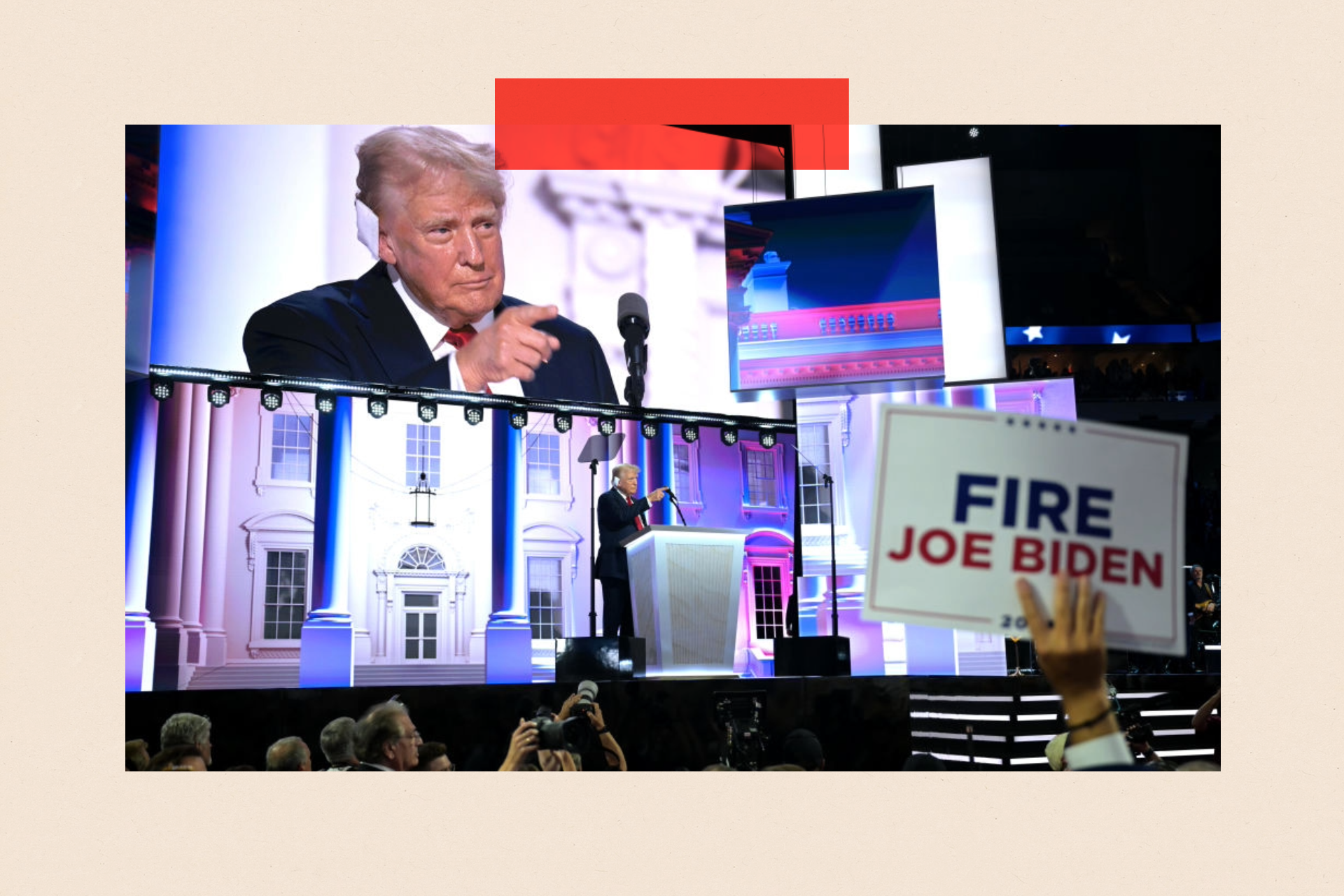
Donald Trump took the stage on Thursday night at the Republican National Convention like a conquering hero. He had cheated death. His Democratic opponents were tearing themselves apart.
His loyalists, who now fill the ranks of his party, packed the Milwaukee arena and cheered enthusiastically throughout his hour-and-a-half speech.
He pledged to serve all Americans if elected then recounted, in a subdued, but almost messianic tone, his brush with a spray of bullets. Some delegates even wore bandages over their right ears like their injured political idol in tribute to him.
"I stand before you in this arena only by the grace of almighty God,” he said. “Over the last few days, many people have said it was a providential moment.” He spoke of dropping to the ground as bullets flew past him and how his supporters had “great sorrow on their faces”.
“When I rose, surrounded by Secret Service, the crowd was confused because they thought I was dead,” he said.
The unity message and its powerful delivery made for a unique convention speech and a remarkable Trump one. But the rest of his speech was more traditional convention fare.
Although he called for ending the “partisan witch hunts” against him, he avoided the extended forays into 2020 election denial that have at times dominated his rally speeches, and he mostly replaced his normal pointed attacks on individual opponents with calls for unity.
There was classic Trump in there too - dark and false claims, sometimes during extended improvisations.
Trump’s performance hinted that for all the talk of a changed man after the attempt on his life and for all the more organised, focused operation behind him, the former president is still inclined to veer off-script, even in the most momentous of occasions.
The question many Americans could be wondering now is which version of Trump will lead the country should he beat Democrat Joe Biden in November. Looking back at the last four days offers some clues.

Donald Trump received a warm welcome as he entered the convention
The address, weakly delivered though it may have been, still represented the culmination of a remarkable stretch for the former president, starting with President Joe Biden’s disastrous presidential debate performance in Atlanta three weeks ago that prompted an uprising in his Democratic Party.
Since then, the US Supreme Court ruled that Trump had broad immunity from criminal prosecution, a judge delayed sentencing for his New York conviction in a hush-money case and another judge entirely dismissed the case against him for mishandling national security documents.
Then he was nearly assassinated. The attempt on his life by a 20-year-old gunman left Trump’s face bloodied and provided the iconic image that was emblazoned on T-shirts and signs at the convention.
All of this meant he and his supporters converged on Milwaukee with a sense that their time had come.
For four slickly produced and relentlessly on-message evenings, the Republican party positioned itself as a welcoming place for all Americans and the former president as a uniting force who would return the nation to greatness.
While there were still partisan speakers throwing red meat to the crowd, they were largely limited to the early-evening slots, when fewer Americans were tuned in to the proceedings.
As the final hour each night arrived, the focus softened and a string of speakers described the former president in deeply personal terms.
It began on Monday, with Trump receiving an exuberant welcome as he entered the convention centre for his first public appearance since the shooting.
He sat in the VIP section of the building and watched as model and social media influencer Amber Rose defended him against accusations of racism: “Donald Trump and his supporters don't care if you're black, white, gay or straight.”
On Tuesday, former White House press secretary Sarah Huckabee Sanders recounted Trump hugging her young son at the White House while Lara Trump painted her father-in-law as “an amazing grandfather”.
Earlier that evening, former South Carolina Governor Nikki Haley, who had been one of Trump’s fiercest critics on the 2024 Republican primary campaign trail, was urging voters who didn’t support Trump “100% of the time” to back his re-election.
“When times are really tough, when he’s got everything to lose and nothing to gain,” Steve Witkoff, a friend of the former president, told the audience, “Donald Trump shows up, and he’s there for you.”

A Republican official said Trump would be “different, better and more effective” during a second presidential term
Trump’s first term in office was marked by sharp political divisions within American society. The day after he was inaugurated, millions marched through the streets of Washington in protest.
His attempts to ban nationals from a list of Muslim-majority countries caused chaos at American airports early in his presidency and border restrictions implemented later led to an outcry about crying children separated from their parents at detention centres.
Trump’s four years in office ended with him refusing to accept his defeat in the presidential election – denialism that culminated in the 6 January riot at the US Capitol, where thousands of his supporters attempted to block certification of President Biden’s victories.
He was denounced by many in his own party, and faced a second impeachment by the House of Representatives. Although he was acquitted in a Senate trial, seven Republicans broke ranks and voted for his conviction. After leaving office, the former president was indicted four times, found culpable for sexual assault by a civil court and convicted of fraud.
That was then, however, and here in Wisconsin – within the security bubble of the Republican National Convention – it was decidedly different now.
The overriding message from the Republicans this week was that those divisions and distractions are things of the past, and that the Trump that America sees today is not the one they might remember from his first White House tenure.
If the rest of the nation agrees, it would represent a remarkable comeback story or a collective act of political amnesia, depending on one’s perspective.
“I think that we really now are the party of unity and inclusiveness,” said Jennifer McGrath, a delegate from Las Vegas, Nevada. “We really are the place to be at this point.”
David Botkins, a member of the Virginian Republican Party’s State Central Committee, said he thought the assassination attempt had changed Trump and that he would be “different, better and more effective” in a second presidential term.
“I think the policies are going to be the same, the conservatism is going to be the same, but there may be a tenderness and a compassion and a gratitude and a respect for divine providence that will inform the tone with which he conducts himself as president for the next four years.”
Policies in the shadows
As for those policies and proposals, the Republican convention offered scant details.
The first three nights of the convention each had a theme – the economy, safety and foreign policy. They formed a framework for the former president’s acceptance speech and offer a useful guide for the key points the party is seeking to emphasise in the campaign ahead.
While Trump only mentioned President Biden by name once, he noted that “this administration” was presiding over soaring inflation (which has now eased), knowing that economic concerns are the bread-and-butter of bids to oust an incumbent officeholder.
Crime and immigration, two issues on which Republicans joined at the hip all week, served as the centrepiece on “safety” night. Polls show that a majority of Americans now favour lowering immigration levels and support Trump’s call for removing millions of undocumented migrants residing in the US. During Texas Governor Greg Abbott’s speech, some convention attendees waved pre-printed signs reading “mass deportation now”.
Conflicts abroad were another prong of the Republican case against Mr Biden. In a particularly dramatic moment on Wednesday, families of six of the 13 US soldiers killed by a car bomb during the 2021 US withdrawal from Afghanistan took the stage to blame the current president for the deaths and claim that the president wasn’t fit to lead the nation’s military.
“With our victory in November, the years of war, weakness and chaos will be over,” Trump said in his speech.
And while there were more specific policy discussions in events held on the sidelines of the convention, they took place well away from prime-time network television cameras.
For instance, on Monday, the Heritage Foundation, a conservative think tank, hosted a “policy fest”, where former Trump administration officials and Republican politicians offered their views on topics like foreign policy, education, immigration, the economy and energy.
The Heritage Foundation is behind the 1,000-page Project 2025 blueprint for a second Trump presidency, which has generated controversy, media attention and relentless attacks from Democrats – and many of the speakers defended their efforts to provide a detailed plan for a new Republican administration.
On Thursday, Trump campaign manager Chris LaCivita made it clear what he thought of these outside efforts, describing Project 2025 - which many officials from the first Trump administration are part of - as a “pain in the ass”.
"The issues that are going to win us this campaign are not the issues that they want to talk about," he said.

The convention showed a party transformed
Eight years ago, when Donald Trump first ran for president, the Republican National Convention in Cleveland was a sometimes chaotic event, with then-establishment conservatives making last-ditch efforts to deny him the nomination.
Trump’s 2024 campaign is run by wily operatives, rather than political fringe characters, and they kept the convention participants on a tight script this week. The party, from the top to the grass-roots, has been fully remade in the former president’s image.
In 2016, Texas Senator Ted Cruz, who finished second behind Trump in the primary voting, pointedly declined to endorse the winner, saying only that Republicans should vote their “conscience”. He was roundly booed.
This time around, he started his speech by saying “God bless Donald Trump” and went on to lavish the former president with praise.
Trump’s other Republican critics were nowhere to be found. His former vice-president, Mike Pence, spent the week on holiday in Montana. Senators like Mitt Romney of Utah, Lisa Murkowski of Alaska and Susan Collins of Maine stayed home. Former President George W Bush also kept his distance.
On Wednesday, it was Trump’s new vice-presidential running mate, JD Vance, who laid out the core tenets of this new, Trump-dominated Republican Party in his nomination acceptance speech.
“We won’t cater to Wall Street, we’ll commit to the working man,” he said. “We won’t import foreign labour, we’ll fight for American citizens. We won’t buy energy from countries that hate us, we’ll get it right here from American workers. We won’t sacrifice our supply chains to unlimited global trade, we’ll stamp every product ‘Made in the USA.’”
Bereaved families force law changes - why did it take so long?
- Published18 July 2024
Fourteen measures from the King’s Speech analysed by BBC experts
- Published17 July 2024
She's made her opening gambit. What's the chancellor's long game?
- Published14 July 2024
The political festivities in Milwaukee were Trumpism from start to finish - a carefully calibrated machine, promoting the party’s most popular agenda items and focusing criticism on one man, President Joe Biden.
But what if Republicans are going after the wrong guy? A growing number of Democrats have called on Mr Biden to be replaced as their presidential nominee and speculation is growing that he might actually listen.
The Democratic convention isn’t until the end of August, leaving time for the president to step aside either for his running mate, Kamala Harris, or for an open process to select another candidate.
On Thursday evening, the Trump campaign sought to highlight their candidate’s strength and vitality by giving him a raucous entrance, preceded by appearances by former wrestler Hulk Hogan, Ultimate Fighting Championship impresario Dana White and a performance by Kid Rock.
The campaign’s intention - to draw a contrast with Mr Biden’s perceived frailty and target younger male voters - was obvious.
That strategy may be less effective against Ms Harris or one of the more youthful Democratic governors who are mentioned as possible Biden successors.
But for the moment, the Republicans are riding high and optimistic about their victory in November, convinced that the former president’s run of good fortune is just getting started.
Top picture: Getty Images
BBC InDepth is the new home on the website and app for the best analysis and expertise from our top journalists. Under a distinctive new brand, we’ll bring you fresh perspectives that challenge assumptions, and deep reporting on the biggest issues to help you make sense of a complex world. And we’ll be showcasing thought-provoking content from across BBC Sounds and iPlayer too. We’re starting small but thinking big, and we want to know what you think - you can send us your feedback by clicking on the button below.
Get in touch
InDepth is the home for the best analysis from across BBC News. Tell us what you think.

